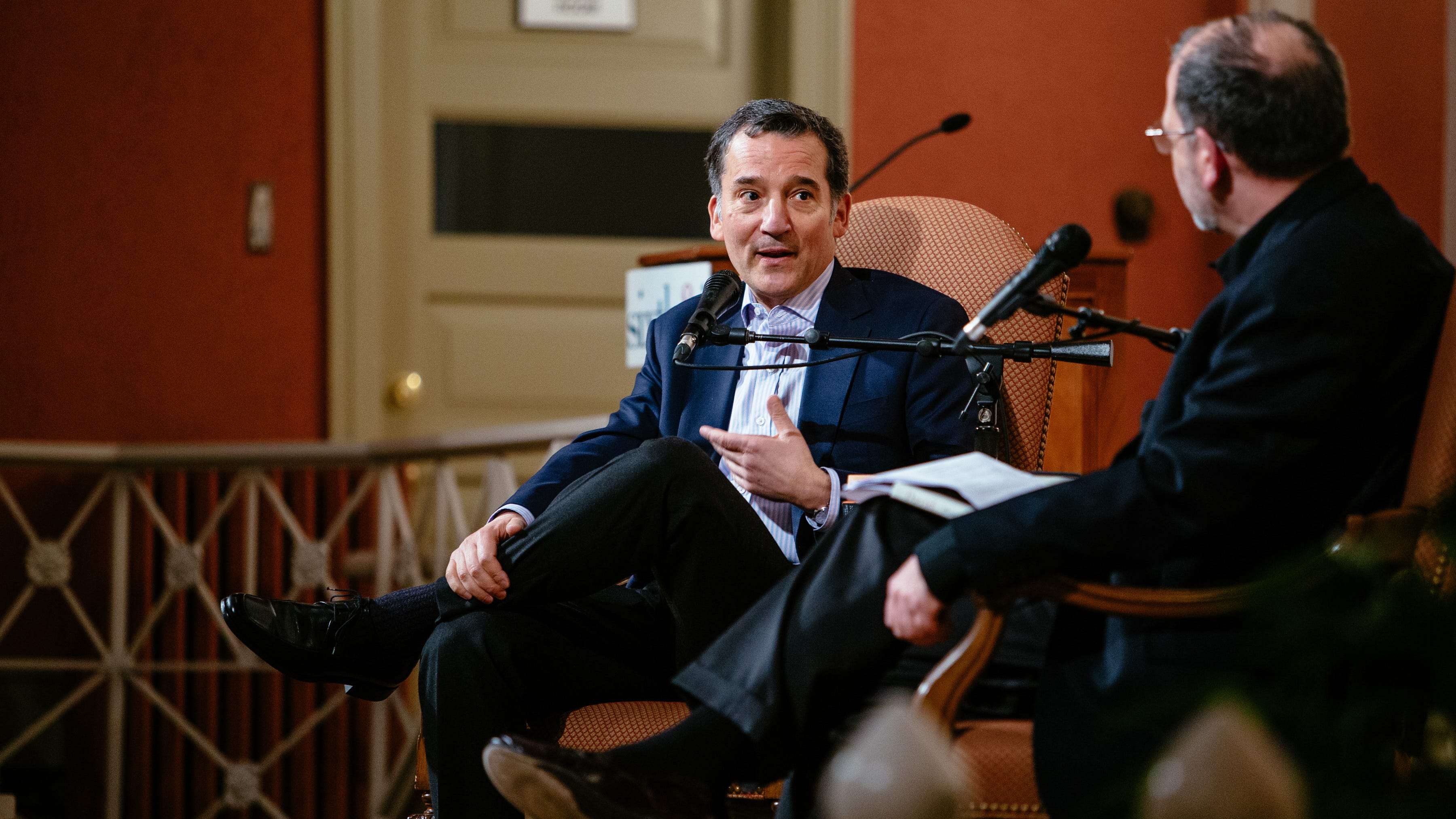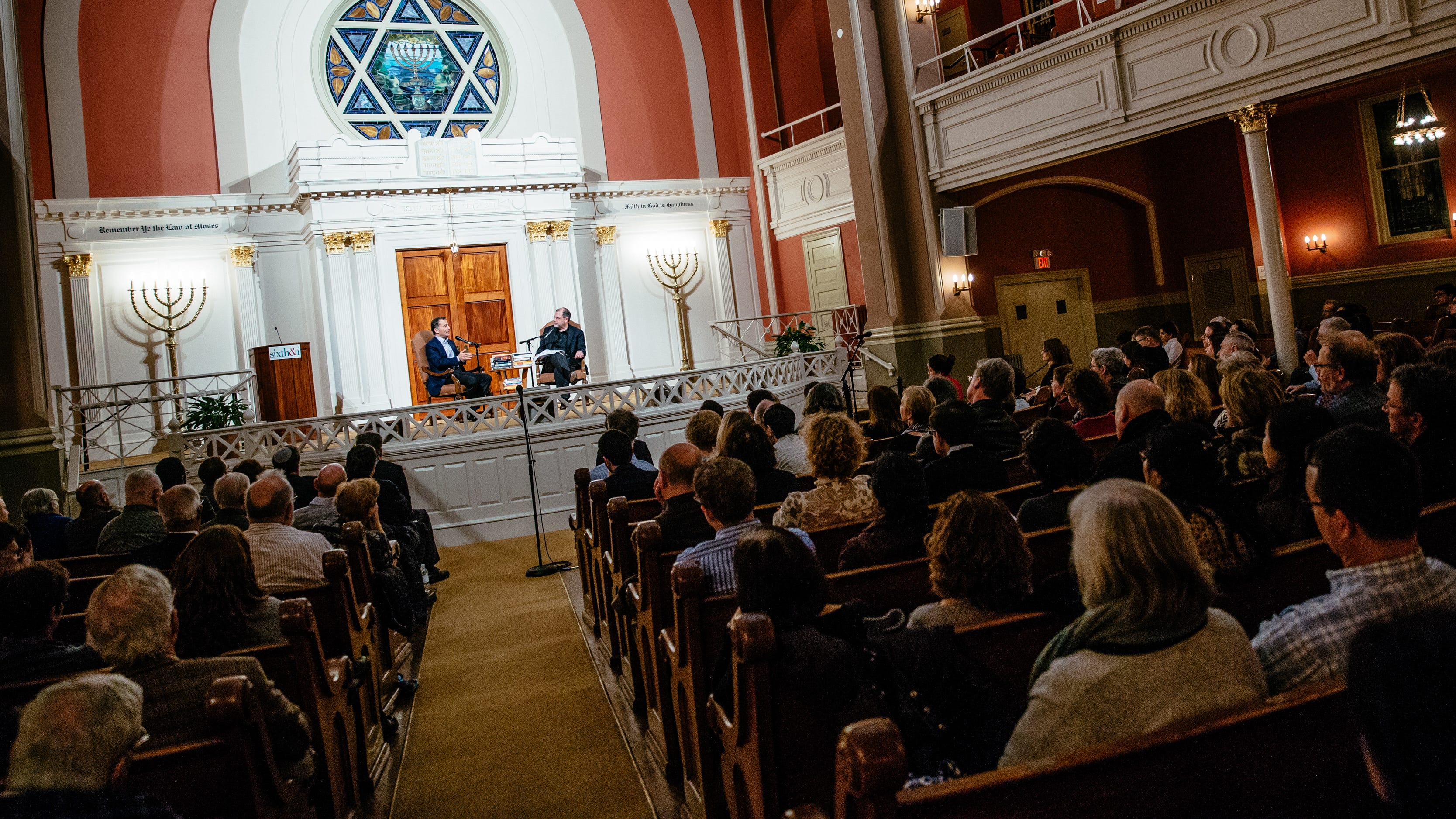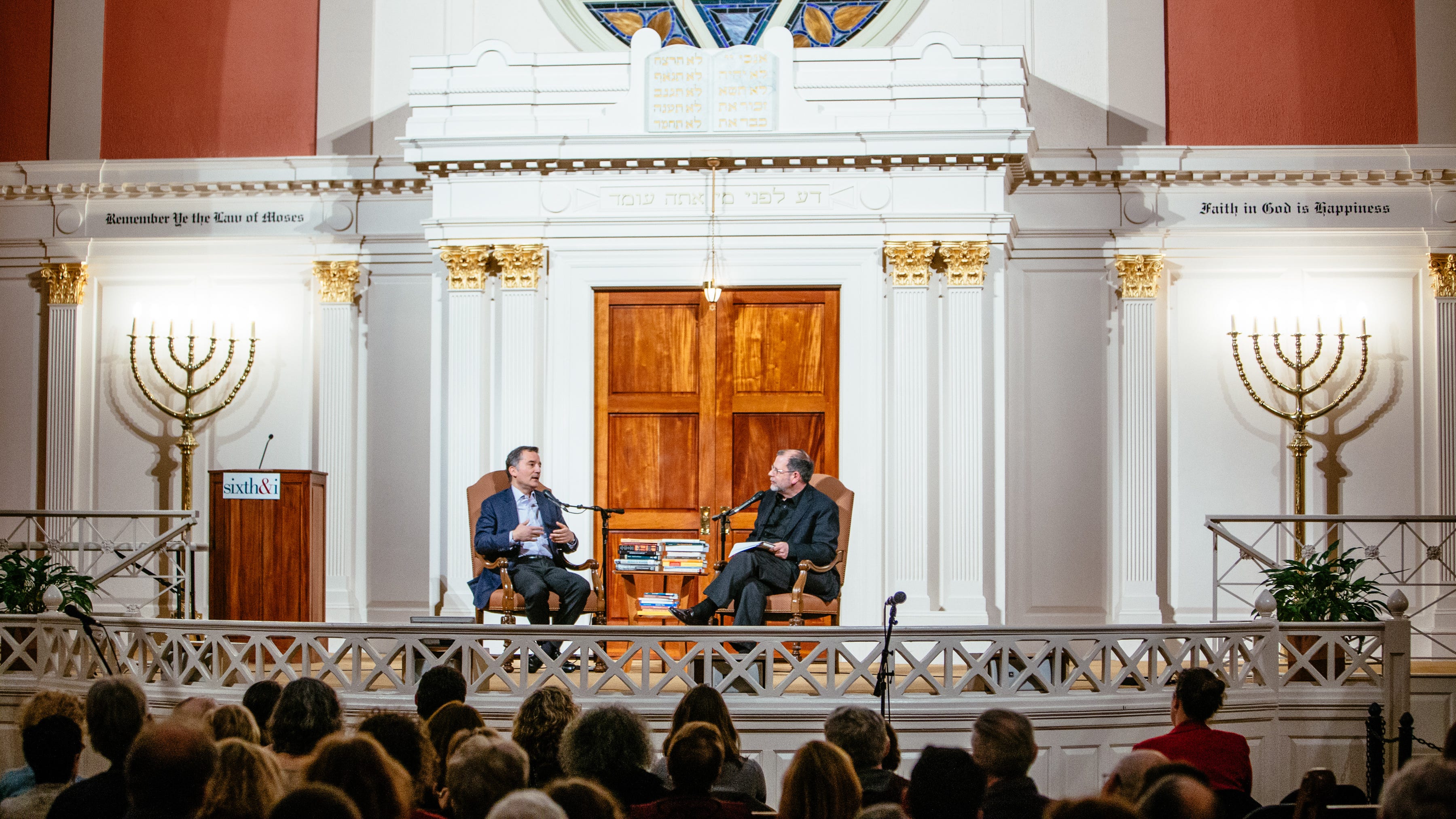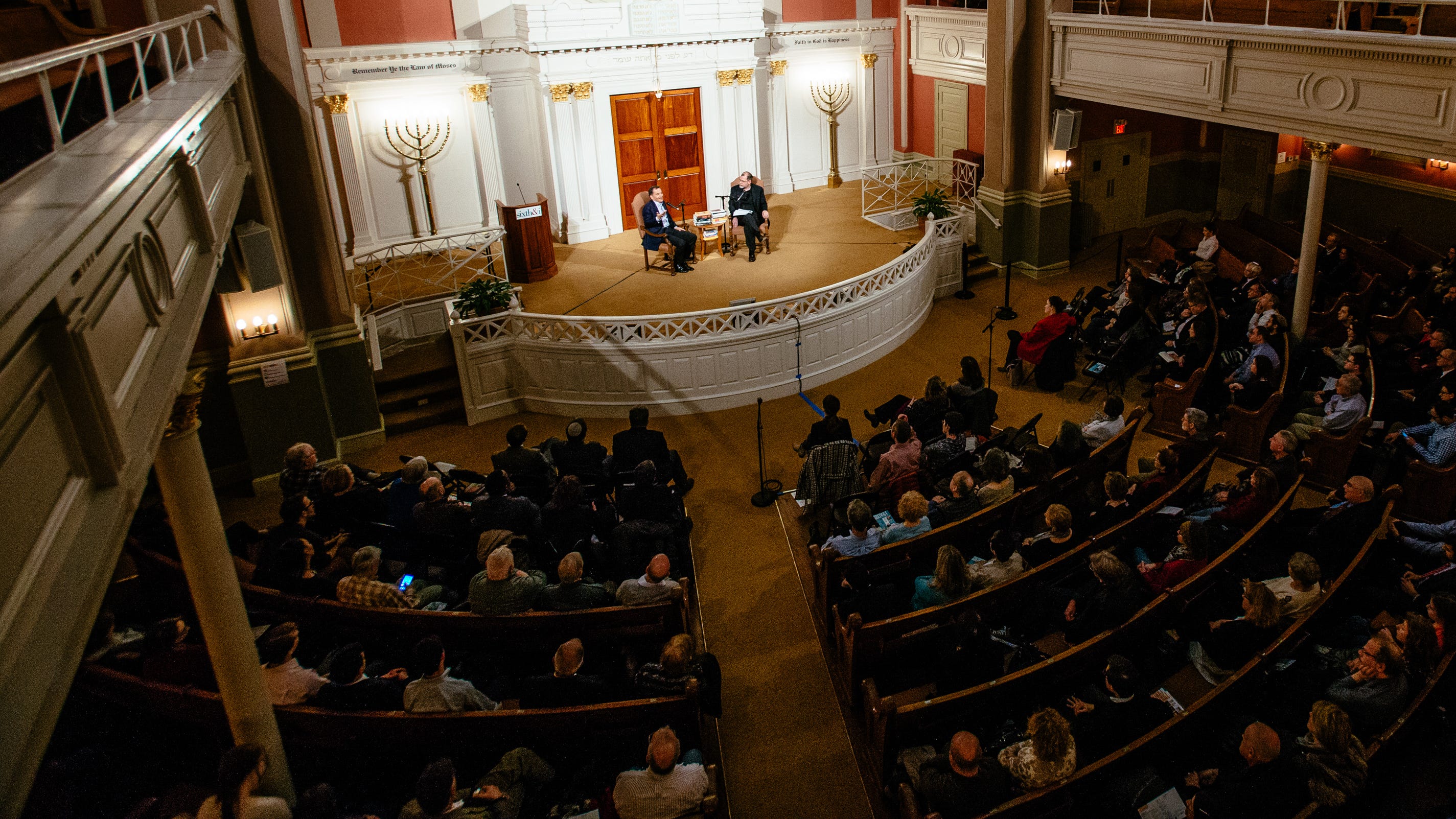Watch the full conversation
Read the full transcript
TYLER COWEN: Thank you all for coming. This is my chance to ask you the questions I want to learn about. So your latest book: it’s called, David: The Divided Heart. And the Book of Samuel is probably the greatest political biography of all time, one of the most significant books on politics. So I’d like to start with some questions there.
RABBI DAVID WOLPE: OK.
COWEN: In how you view that book, why is it that David, if indeed you believe this, was a better king than Saul?
WOLPE: First of all, thank you for inviting me to [laughs] this grilling . . . dialogue. I do believe that David was a better king than Saul. The first test of a king in the ancient world is what David did that is remarkable, and that is, he died in his bed. That’s rare among ancient and medieval kings, as you know. And so survival in and of itself is a test of merit. Even not speaking about in divine eyes, but just in human eyes.
Also in some way, Saul seemed to have lost the confidence of the people. And while no contemporary analogies are intended in anything that I say [laughs], you cannot underestimate the value of charisma in a political leader. And David had tremendous charisma. So when the women of Israel went out into the streets and said, “Saul has killed thousands, but David has killed tens of thousands” — that was already a signal that Saul was going to fail and fall.
So I think that on those two, just survival and charisma alone, you would have to say that David was a more successful leader.
COWEN: So if someone makes the argument that David was a better king because he never committed idolatry, would you accept that description?
WOLPE: A better king cause he never committed . . .
Well, no. Because it’s not clear that Saul committed idolatry. It’s pretty clear that David didn’t. I would say . . .
COWEN: And also, Saul is told to kill the king and to get rid of all the Amalekites, and he doesn’t do that.
WOLPE: And he doesn’t.
COWEN: And that is mentioned again, that that was his failing. And isn’t that what appears to be a small thing, a big thing, or no?
WOLPE: Yes. The sin there — that’s actually a very problematic sin, where he’s told, “You didn’t kill enough people, and you didn’t slaughter the king when you were supposed to.” But the idea is that, the way the Talmud puts it is that somebody who is kind to the cruel will end up being cruel to the kind. And the idea that your enemies have to be dispatched or at least effectively subdued was something that Saul didn’t have the stomach for. And I would say in the ancient world, maybe that would make you an unsuccessful king.
COWEN: So if the commands of God are not necessarily visible to the rest of us, what for you is the implied political epistemology of the book? How do we know when we have a good king, leader, president, if that’s an important feature, and we as outsiders don’t know who has received what message or commands from God?
WOLPE: How do we know in general? Or how do we know in a book of the Bible? Because those could be two different . . .
COWEN: Both. Sure.
WOLPE: I would say that one of the problems with the Bible is that you can always say, “How did the person know that God was speaking to them?” Since I can’t, as Queen Elizabeth said, “cut windows into people’s souls,” I have no idea if God spoke to David. That’s something you have to either take on faith or not.
What I do know is that David was successful in unifying the kingdom, subduing rebellion, leaving a lasting legacy where people believed that he would lead ultimately to the Messiah, and also installing his son in the kingship. And his son succeeded in building the temple, which became, for a long time, the center point of Jewish religion. And he established Jerusalem as the capital, which if he had only done that, would’ve been an extraordinary achievement.
So if you want to attribute that to the fact that David listened to God, and that the Psalms are in fact an expression of David’s soul, I don’t have a problem with that. But if you want to be a pragmatist about it and just look at results, I would say that’s how you judge the success of a leader then and now.
On Biblical implications for the existence of a political order
COWEN: If you think of it being an implicit question in the book of Genesis, first, how is there a political order at all? And also why is it that brothers do not kill each other? And those in Genesis, to my reading, were not at all resolved. And then you have the Book of Samuel and the David story — by the end of that, what’s the extra thing we’ve learned? What’s the resolution to those questions?
WOLPE: To the questions of . . . ?
COWEN: How is it that political order is possible at a deep, metaphysical level? And how is it that brothers don’t kill each other? Is there any resolution?
WOLPE: Well, first of all brothers not killing each other is always a provisional statement.
[laughter]
WOLPE: I say this with two of my brothers in the audience. And I think that it’s fair to say that we have not killed each other yet.
But let me first give you my sermonic answer. The beauty of the book of Genesis is, all through Genesis, brothers are fighting even though they don’t kill each other in the end. And then the very last set of brothers — the reason that they fight is because generally, in one way, the younger is preferred over the older, and there are questions of birthright and so on. And then toward the very last scene, there are two brothers, Ephraim and Manasseh. Manasseh’s the older, Ephraim is the younger. Jacob blesses, as the grandfather, he blesses the younger with the better blessing, and Manasseh doesn’t protest. He’s actually kind of the silent hero of the book.
So I would say that there is a degree of acceptance that is taught, an unequal distribution of goods, if I can transgress into your field for a moment. And that’s the way the world is, and you have to accept that there will be different degrees of talent and gifts and so on and so forth. And the acceptance of that, that is the acceptance of God’s gifts at unequal levels, is the way interpersonally brothers succeed in not killing each other.
And in terms of the establishment of a political order, I think there the idea, at least in Samuel, what starts to happen is that there is an understood division between the political order and the religious order, that is Samuel’s the high priest and the leader. And he gets very upset when they want to have a king because he says, “Why am I not good enough?” The reason is, because you need a political order that is different. You need separation effectively of synagogue and state to some degree.
On the self-confidence of flawed leaders, yesterday and today
COWEN: Let’s say you have a leader who has had several wives, has served the interests of a foreign power, is very good at blame shifting. Should that leader be as self-confident as David seems to be in the Book of Samuel?
WOLPE: Apparently.
[laughter]
WOLPE: According to the standards of the time, having several wives was normative, and they weren’t sequential, they were simultaneous.
[laughter]
WOLPE: So as my friend Joseph Telushkin says, “Polygamy does exist in the Bible, it’s just never successful.” David does have many wives, and very strained and interesting and complex relationships with women. David has the most complicated and most described relationships with women of any character in the Hebrew Bible.
Those qualities that can be negative, in David are to some extent positive. One of the things that draws David out of the charge of simple narcissism is that he really listens, he pays attention — he pays attention to women over and over again. He listens to what they say and changes himself because of it. And that’s not a characteristic of men in the ancient world or the modern one that you can rely on.

So I would say next to his hubris, there’s a self-effacement, and next to his charisma, there’s also a receptivity. And yet, in the complex of his personality, you can understand why people might look at him to draw a very different political figure, the way that at some point, I think it was [William] Seward said about Lincoln, which is, “He’s the best among us.”
COWEN: Let me press you on two of the things you say in the book. There are two things you said that surprised me, so let me try to become unsurprised. I think it’s on page 33, you said, “Of all the characters in the Book of Samuel, the one you could best imagine as also being a king is Jonathan because Jonathan had a capacity for self-sacrifice.”
WOLPE: Right.
COWEN: And that surprised me because, again, I’m very much a novice on this territory, but I think of him as a little too nice a guy and not strong enough, in the right way, to actually be a king in that time.
WOLPE: I think you’re probably right. I could imagine him as a king. First of all, he was the son of the king, so he was the natural heir. And as we know, that often happens — that the natural heir may not be the fitting king. And also, I thought that Jonathan was the kind of person that people would be drawn to, but I think that that’s probably a worthy caveat: He probably would’ve gotten killed in the kingship in a way that David was too strong a personality and too crafty an operator to allow himself to be killed.
On Chronicles as the boring version of Samuel
COWEN: Now on page 18, there’s a claim you make and I don’t want to misquote you here, but I understand you to be saying something like, “Chronicles is like a boring retelling of the story of David.”
WOLPE: That’s almost a direct quote. I said, “Chronicles is Samuel made boring.”
COWEN: But again, coming to this as an outsider, I read Chronicles, I think of Chronicles as the very long-run perspective, saying that all of these events of the moment, which are so dramatic, so emotional, so engrossing, they seem to be what’s so relevant. Just like we’re all entranced by Twitter or the daily news.
But ultimately, what matters is the long run of history. Does the kingdom survive? And it’s actually the contrast between the extreme impersonality of Chronicles and the deeply personal story of Book of Samuel — that are these multiple duelers competing, layers or levels of wisdom. And that, that’s better than either book taken alone. Am I off base there?
WOLPE: No, I think that’s a beautiful explanation. I would say two things about it: One is, if you’re writing this story of David, and you’re writing the story of David as opposed to, say, a political analysis of David’s kingship, then you want the story at its most dramatic, full of blood and fury and sex and betrayal and so on. And that’s in Samuel.
The second is that Chronicles — it’s not just that Chronicles is . . .
When I said it was made boring, what I meant was, not that it’s a dry textbook as opposed to a bodice ripper of a romance novel. But that it takes the very humanness of David and tries to sanctify him, in a way that I think is untrue to David’s character. It’s the first time, for example, that the character of the Satan appears as an inciter. He incites David to do something bad, so that way you don’t have to blame David that he did it.
And in that sense, I think the Chronicles is a sanitizing of the real history of David, even though it may be a more interesting political — I don’t know — more interesting, a different political lens.







